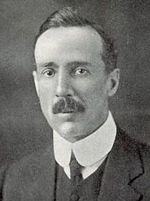Henry Pigott, Date of Birth, Place of Birth, Date of Death
TweetHenry Pigott
Australian politician
 Date of Birth: 02-Oct-1866
Date of Birth: 02-Oct-1866
 Place of Birth: Sri Lanka
Place of Birth: Sri Lanka
Date of Death: 08-Jul-1949
Profession: politician
Nationality: United Kingdom, Australia
Zodiac Sign: Libra 
About Henry Pigott
- Henry Robert Maguire Pigott (2 October 1866 – 8 July 1949) was an Australian politician.
- He was a member of the Australian House of Representatives from 1913 to 1919, representing the electorate of Calare for the Commonwealth Liberal Party and its successor the Nationalist Party. He was born in Ceylon of Irish Baptist missionary parents and attended the London School for the Sons of Missionaries.
- He worked for the Bank of Australasia in England before migrating to New South Wales in 1885.
- He worked as an official for the Australian Joint Stock Bank in a succession of branches: as an accountant at Summer Hill and then Cooma and then bank manager at Milton and finally Blayney.
- In 1899, he left the banking industry and became a stock and station agent in Blayney, in which capacity he continued up until his election to parliament.
- He also purchased a 13,000 acre pastoral property, "Cadara", near Tottenham, in 1910.
- He was an elected member of the council of the Liberal Association of New South WalesIn 1913, he was elected to the Australian House of Representatives for the Commonwealth Liberal Party, defeating Labour member for Calare Thomas Brown.
- He held the seat until 1919 (during which time the Liberal Party had become the Nationalist Party), when he was defeated by Labor's Thomas Lavelle.
- An attempt to regain the seat as a member of the newly formed Country Party in 1922 was unsuccessful.After his parliamentary defeat, Pigott resided in Blayney while retaining the successful "Cadara" property".
- He remained active in farming circles, serving as a representative of the Carcoar and Mandurama branch of the Graziers' Association for over twenty years and remaining involved in the Farmers and Settlers Association.
- He sold "Cadara" in 1945 and purchased a bungalow in the Sydney suburb of Manly, which he lived in thereafter.
- He died at his Manly home in 1949.
Read more at Wikipedia
See Also
- Famous People's Birthdays on 02 October, Sri Lanka
- Famous People's Birthdays in October, Sri Lanka
- Famous People's Birthdays on 02 October, United Kingdom
- Famous People's Birthdays in October, United Kingdom
- Famous People's Birthdays on 02 October, Australia
- Famous People's Birthdays in October, Australia
- Famous politician's Birthdays on 02 October, Sri Lanka
- Famous politician's Birthdays in October, Sri Lanka
- Famous politician's Birthdays on 02 October, United Kingdom
- Famous politician's Birthdays in October, United Kingdom
- Famous politician's Birthdays on 02 October, Australia
- Famous politician's Birthdays in October, Australia

